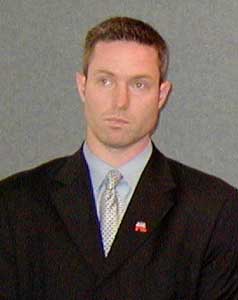-
- Same-sex marriage moves to top of election topics
- Domestic partner benefits involved in Proposal 2 debate
- Ohio Supreme Court rejects legal challenge to same-sex marriage
- Census snapshot of gay and lesbian service members and vets
- Schools should be kept out of same-sex marriage debate
- Mayor’s appointee resigns over New York domestic partner policy
- National News Briefs
- World News Briefs
national
Same-sex marriage moves to top of election topics
High voter turnout expected in states with marriage amendments on ballot
Published Thursday, 28-Oct-2004 in issue 879
WASHINGTON (AP) – A year after the Massachusetts Supreme Court gave same-sex couples the right to marry, the issue of same-sex marriage has added an unpredictable element to races both for the presidency and for Congress.
Opponents of same-sex marriage see like-minded social conservatives trooping to the polls, a plus for President Bush and Republicans, especially in the 11 states with ballot initiatives on banning same-sex marriage.
“People are really going to turn out, especially in states where this is on the ballot,” said Roberta Combs, president of the Christian Coalition of America. That could be crucial in four of those 11 states – Arkansas, Ohio, Michigan and Oregon – where the vote for president is too close to call.
But Christopher Barron, spokesperson for the gay Log Cabin Republicans, warned that pressing the gay issue was a “serious gamble” that could backfire. “Here we are a couple of weeks out from the election and the president is still trying to energize his evangelical base, unwilling to reach out to moderate swing voters,” Barron said.
President Bush, in the final presidential debate, reiterated his support for a constitutional amendment banning same-sex marriage, saying he was concerned that otherwise “activist judges” would rewrite the definition of marriage.
Democratic presidential candidate John Kerry expressed the view of many in his party that marriage law should be determined by the states, not a constitutional amendment. He opposed same-sex marriage but supported the rights of same-sex couples to form civil unions. Kerry also caused a storm by justifying his position with a reference to Vice President Dick Cheney’s lesbian daughter.
Same-sex marriage and gay rights have also become a part of very close Senate contests in Oklahoma, South Dakota and North and South Carolina.
An independent group has run an ad in South Dakota, where Senate Democratic leader Tom Daschle is in a tight race, saying Daschle “refuses to protect marriage; he would let liberal activist judges redefine it.”
In Arkansas, GOP state Sen. Jim Holt has made same-sex marriage the central theme of his long-shot campaign against Democratic Sen. Blanche Lincoln. It’s not the only issue, he said, “but it is the most important issue, I believe, in America.”
The Republican National Committee took up that theme in a mailer sent to voters in Arkansas and West Virginia, with a picture of a man placing a ring on the hand of another man. It said a failure to vote would open the way for liberals to ban the Bible and allow same-sex marriage.
“The people who put this out [are] taking West Virginians to be gullible, ignorant fools,” Sen. Robert Byrd, D-W. Va., told an interfaith group in his state.
But the Christian Coalition’s Combs said defense of marriage transcends even abortion as a social issue this year because it reaches well beyond social conservatives. “It’s a deep moral issue for people of faith,” she said.
Peter Sprigg, senior director of policy studies at the Family Research Council, said the same-sex marriage referendums were a “legitimate response to the threat posed by the homosexual groups and activists groups” and were definitely not “cooked up as a tool to help reelect the president.”
Cheryl Jacques, president of the Human Rights Campaign, a gay and lesbian support group, saw it differently, saying it was “no coincidence” that in states where races are tight “we’re seeing the ramping-up of the issue with billboards and flyers.”
The Family Research Council and other conservative groups are putting out scorecards to inform voters how their representatives and senators voted on proposed constitutional amendments to ban same-sex marriage that were rejected in both the House and Senate this year.
In North Dakota, Mike Liffrig, in an uphill race against Democratic Sen. Byron Dorgan, attacked Dorgan over his constitutional amendment vote using an ad showing two tuxedo-wearing men moving in for a kiss.
In North Carolina, Rep. Richard Burr, in a tight Senate race with Clinton White House chief of staff Erskine Bowles, cited Bowles’ opposition to a constitutional amendment in an ad that said “it’s a shame Erskine Bowles doesn’t have the courage to stand up for traditional marriage.”
Gay rights in general has cropped up in several other close senatorial races.
Former Rep. Tom Coburn, the Republican candidate in Oklahoma, sparked a controversy when he warned of “rampant” lesbianism in some Oklahoma schools. GOP Rep. Jim DeMint, running for the Senate in South Carolina, caused a stir by saying that openly gay people and unwed, pregnant women should be barred from teaching in public schools.
|
|
Copyright © 2003-2025 Uptown Publications


